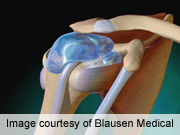- Could Your Grocery Store Meat Be Causing Recurring UTIs?
- Are You Making This Expensive Thermostat Error This Winter?
- Recognizing the Signs of Hypothyroidism
- 10 Strategies to Overcome Insomnia
- Could Artificial Sweeteners Be Aging the Brain Faster?
- Techniques for Soothing Your Nervous System
- Does the Water in Your House Smell Funny? Here’s Why
- Can a Daily Dose of Apple Cider Vinegar Actually Aid Weight Loss?
- 6 Health Beverages That Can Actually Spike Your Blood Sugar
- Treatment Options for Social Anxiety Disorder
Prompt Treatment of Shoulder Dislocation May Prevent Future Problems


Immediate medical treatment of a dislocated shoulder reduces the risk of bone, muscle and nerve injuries as well as the risk of future dislocations, a new study found.
Prompt treatment includes scans of the shoulder before and after it is reset. These scans check for possible fractures or other muscle and bone injuries, according to the researchers who reviewed available literature on the topic.
The shoulder has the greatest range of motion of any joint in the body, and it’s the most common site for a full or partial dislocation, the researchers said.
The researchers added that 40 percent of people with a shoulder dislocation also have a ligament or muscle injury. As many as one in three also has a rotator cuff tear. Males 10 to 20 years old have the highest rate of shoulder dislocations, the researchers noted in a news release from the American Academy of Orthopaedic Surgeons.
In 2011, there were more than 175,000 visits to U.S. emergency departments for treatment of shoulder dislocations.
If someone dislocates a shoulder, they shouldn’t wait longer than a week to get medical care. That’s because they need to be monitored for possible nerve damage before and after the shoulder is reset, the study authors said.
After the ligaments have healed, people may need rehabilitation to prevent shoulder stiffness. Elderly patients with persistent weakness in the shoulder should be checked for possible rotator cuff tears, the study authors recommended.
“Acute shoulder dislocations can be effectively managed by closed reduction maneuvers,” study lead author Dr. Thomas Youm, clinical assistant professor at New York University Hospital for Joint Diseases, said in the news release.
‘
He added that there are many “closed reduction techniques available for relocation of a dislocated shoulder. A thorough understanding of these reduction techniques as well as immobilization strategy and rehabilitation regimens can successfully treat dislocations of the shoulder and hopefully prevent the need for surgery.”
The study appears in the December issue of the Journal of the American Academy of Orthopaedic Surgeons.
More information
The U.S. National Library of Medicine has more about shoulder dislocations.
Source: HealthDay
Copyright © 2026 HealthDay. All rights reserved.










